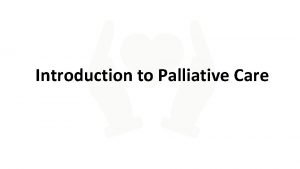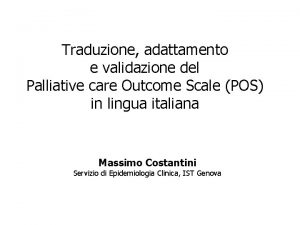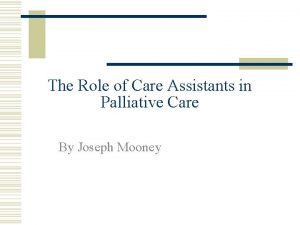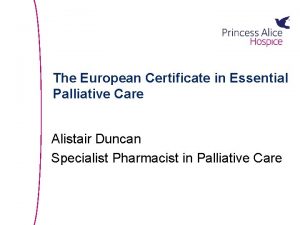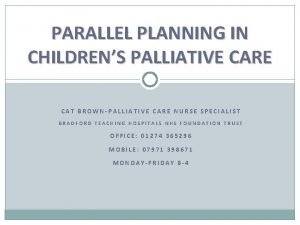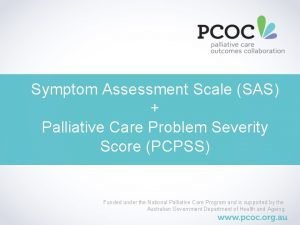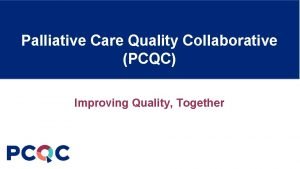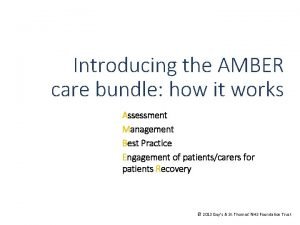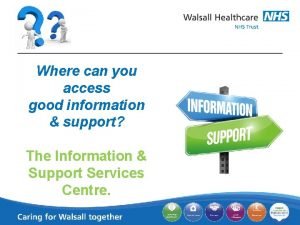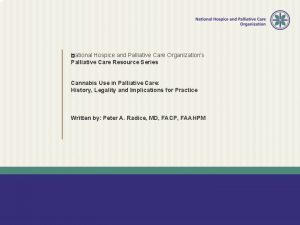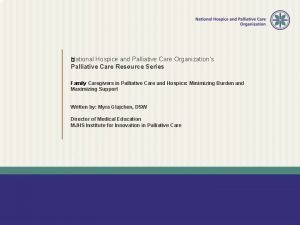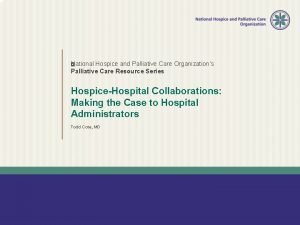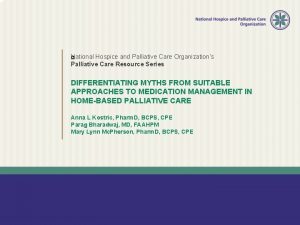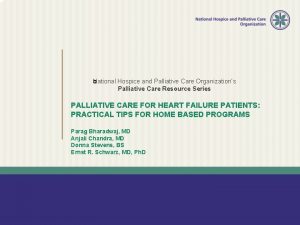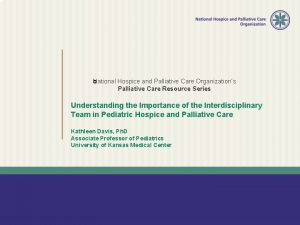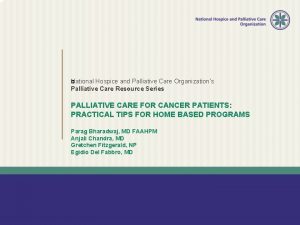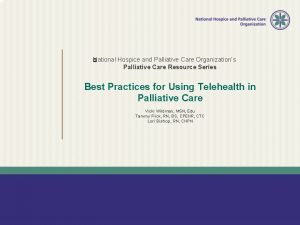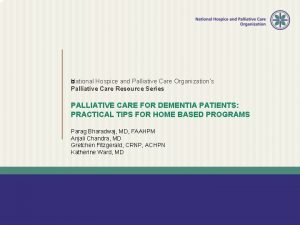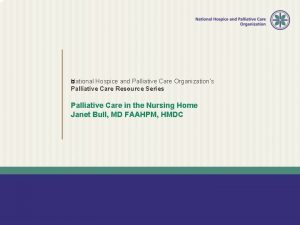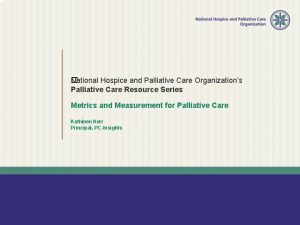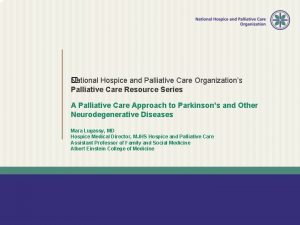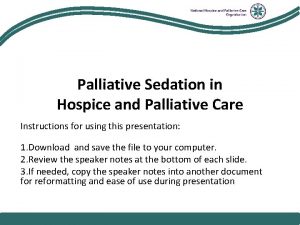National Hospice and Palliative Care Organizations Palliative Care


















- Slides: 18

National � Hospice and Palliative Care Organization’s Palliative Care Resource Series Finding Calm in The Storm: A Palliative Care Approach to Navigating the Family Meeting Steven M. Radwany, M. D. , FACP, FAAHPM

Objectives • I� dentify the potential impact on family meetings of providers’ preconceptions and personal histories • Describe current research concerning family meetings • Provide a general outline for effective family meetings • Examine pitfalls and challenges that might occur during a family meeting

Preconceptions and Personal Histories • � Definition/s of family vary – Family must be defined by the patient – Family can include friends, cousins, co-workers, teammates/platoon members – If patient is unable to define, providers need to interview available family or friends and/or use best judgment • Our preconception of patient/family suffering may differ from the reality of their experience • Acknowledge mutual experiences of fatigue and exhaustion

Research: Family Meetings • � Majority of families perceive – Having inadequate communication and contact with physicians in the hospital – Receiving Inadequate help with emotions and poor family support – Feeling better prepared after advance care planning discussions – Being poorly prepared for making end-of-life decisions – Their lack of preparation lead to intensification of post-death grief

Research: Family Meetings • � Families describe ongoing burdens of end-of-life decisions – Lingering questions about decisions or recommendations from healthcare providers – Persistent resentments regarding those decisions – Guilt over having acceded to physician recommendations • Many families perceive that providers reside in silos of care – No communication or coordination of care among practitioners for the betterment of the patient

Research: Family Meetings • � Without a doubt, effective family meetings can help! • Proactive and structured family meetings can – Improve family understanding and acceptance of the clinical situation – Decrease post-traumatic stress disorder and complicated grief in survivors – Shorten length of stay in hospital and decrease costs

The Family Meeting - A Reproducible Skill • � Preparation can mean everything! – Decide who should be there – Secure a speaker phone for out of town family or friends – Be present – cells and pagers should be turned off • Pre-meeting to assure a common understanding of goals – – – Assess understanding, concerns and coping Share information and provide education Provide emotional support Build trust Elicit patient goals and values Support and educate healthcare team

The Family Meeting – A Reproducible Skill • � Start the meeting with – Clear introductions of everyone present – Be present! Always sit, avoid checking phone, pager, or watch • Use a trigger to begin conversation – Begin with anything that might be important to the patient and family Simply ask: • Tell me about ____ • Where did he grow up? • What did she do? • What was important to him? • What most impressed you about her?

The Family Meeting – A Reproducible Skill • E �stablish what the patient and family know or what they have been told – Use patience, silence, encouragement and appropriate open-ended questions – Never assume you know what they know or what they understand • Begin by asking: – Please tell me what has happened up to now? – What have the doctors told you about what has happened? – Help and allow the patient and family speak more than you do

The Family Meeting – A Reproducible Skill • � The next step is acknowledgement – Families need to know they are being heard, understood and appreciated – Reflect back on what you have heard – Clarify YOUR understanding of THEIR understanding of the patient’s medical reality – Prevent any one person from dominating the conversation – Do not be defensive! – Avoid denying anyone’s version of what has occurred unless it is so far removed from reality that clarification is needed

The Family Meeting – A Reproducible Skill • Honestly affirm the care the family has provided You might say: – You and he have been through a lot. – I can’t imagine dealing with everything you and your family have faced. – I’m sorry about what’s happened. I’ll look into it. I know we need to do better for you and for him. – You have been a great advocate and caregiver for ___.

The Family Meeting – A Reproducible Skill • Clearly and succinctly communicate the patient’s prognosis to the family. – Assess their desire and readiness to hear prognostic information – Assess your own readiness and concerns • How will your own comfort with the prognosis and its communication affect your communication with the family? • What is your level of certainty? • What is your level of anxiety? • Be clear, concise and empathic when communicating the patient’s prognosis

The Family Meeting – A Reproducible Skill • Offer empathy and support VALUE Mnemonic (Curtis JR, White, JB. Chest 2008; 134: 836 -843) – Value comments made by the family – Acknowledge the family emotions – Listen – Understand the patient as a person – Elicit family questions • Provide non-verbal support – tissues, hand on shoulder • “I wish” statements (Quill TE, Arnold RM, Platt Annals Intern Med. 2001; 135: 551 -555)

The Family Meeting – A Reproducible Skill • Establish Goals of Care – Must always be in the context of the patient’s values with the medical reality of the situation defining potential outcomes • Assess what family has heard from you and what they understand • Review the Plan of Care and make a plan to follow-up after family meeting • Put something in writing for the patient, family and colleagues

Pitfalls and Challenges • Too much information is shared – – Providers spend more time talking then patient and family Providers do not tolerate silence well Providers pass over emotions of patient and family Providers miss teaching opportunities • Binary Framing – Provider sees only 2 possible outcomes of the meeting – Alternatives are not explored • Communication styles – Are different! – Families may not hear or visualize what we imagine

Pitfalls and Challenges • Loaded vocabulary – Providers defensive when asked about “starving” the patient – Questions must be answered directly and honestly • Escalating emotions – Become a participant observer – Stay calm, lower voice, be honest and clear – Seek support after meeting if needed • Unrealistic expectations – Expecting to get too much done – First meeting needed to establish trust and exchange information

Pitfalls and Challenges • Boundaries of language and culture When using an interpreter – – – – – Interpreter must be trained for medically related issues Assure patient and family of confidentiality Speak directly to patient and family Use open and respectful curiosity Simple short sentences work best Empathic statements are still necessary Check to see if interpreter needs help processing after the meeting Assess the patient’s level of autonomy Determine the locus of control and family role in decisions

Summary § § § § § Have a plan! Start with introductions and ground rules Assess what family knows Speak less and listen more Be brief and clear Accept silence Acknowledge emotions Assess understanding Support Summarize and provide follow up
 Palliative care vs hospice care
Palliative care vs hospice care Franciscan hospice and palliative care
Franciscan hospice and palliative care National palliative care research center
National palliative care research center Bluegrass hospice care
Bluegrass hospice care Integrated palliative care outcome scale
Integrated palliative care outcome scale Difference between metoclopramide and domperidone
Difference between metoclopramide and domperidone Palliative care programme
Palliative care programme Rug palliative care
Rug palliative care Palliative care programme
Palliative care programme Principles of palliative care
Principles of palliative care Palliative care in nepal
Palliative care in nepal Palliative care assistant
Palliative care assistant European certificate in palliative care
European certificate in palliative care Parallel planning palliative care
Parallel planning palliative care Sas palliative care
Sas palliative care Pcqc registry
Pcqc registry Just in case bag palliative care
Just in case bag palliative care Amber bundle
Amber bundle Goscote palliative care centre
Goscote palliative care centre
